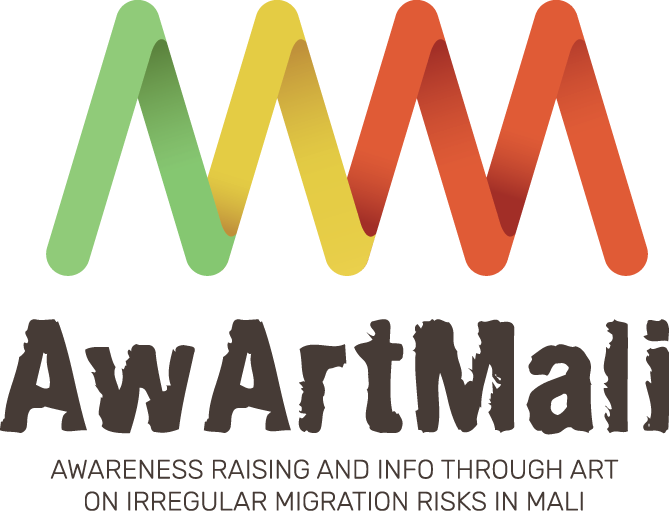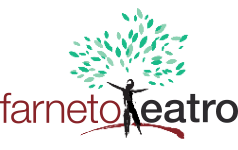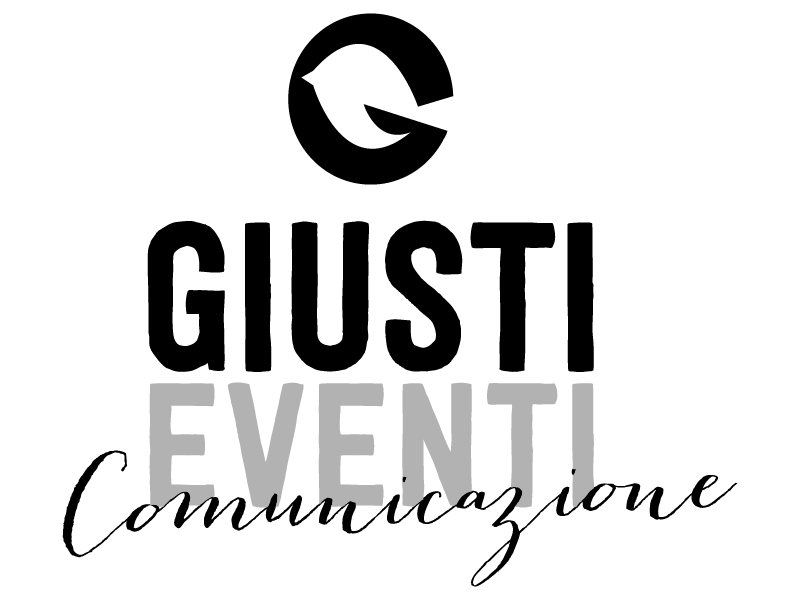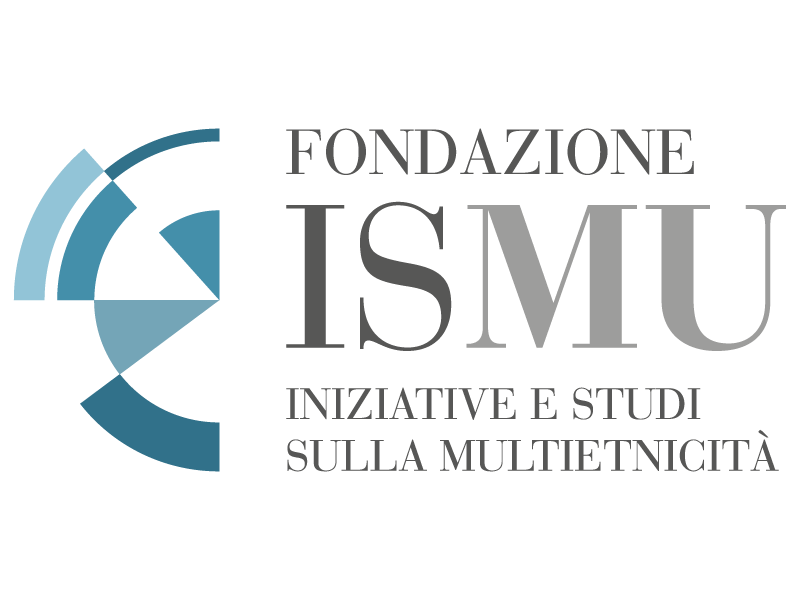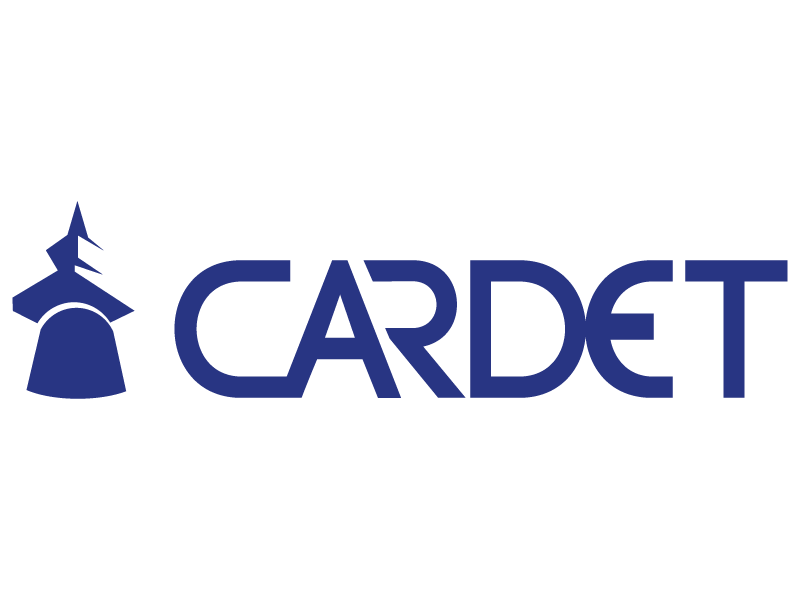Last days of rehearsals for “Tunka / L’aventure” at the Centre Gambidi in Ouagadougou, Burkina Faso, where the show goes on stage on January 26 and 27.
On stage at Ouagadougou on January 26th goes “TUNKA / L’AVENTURE”
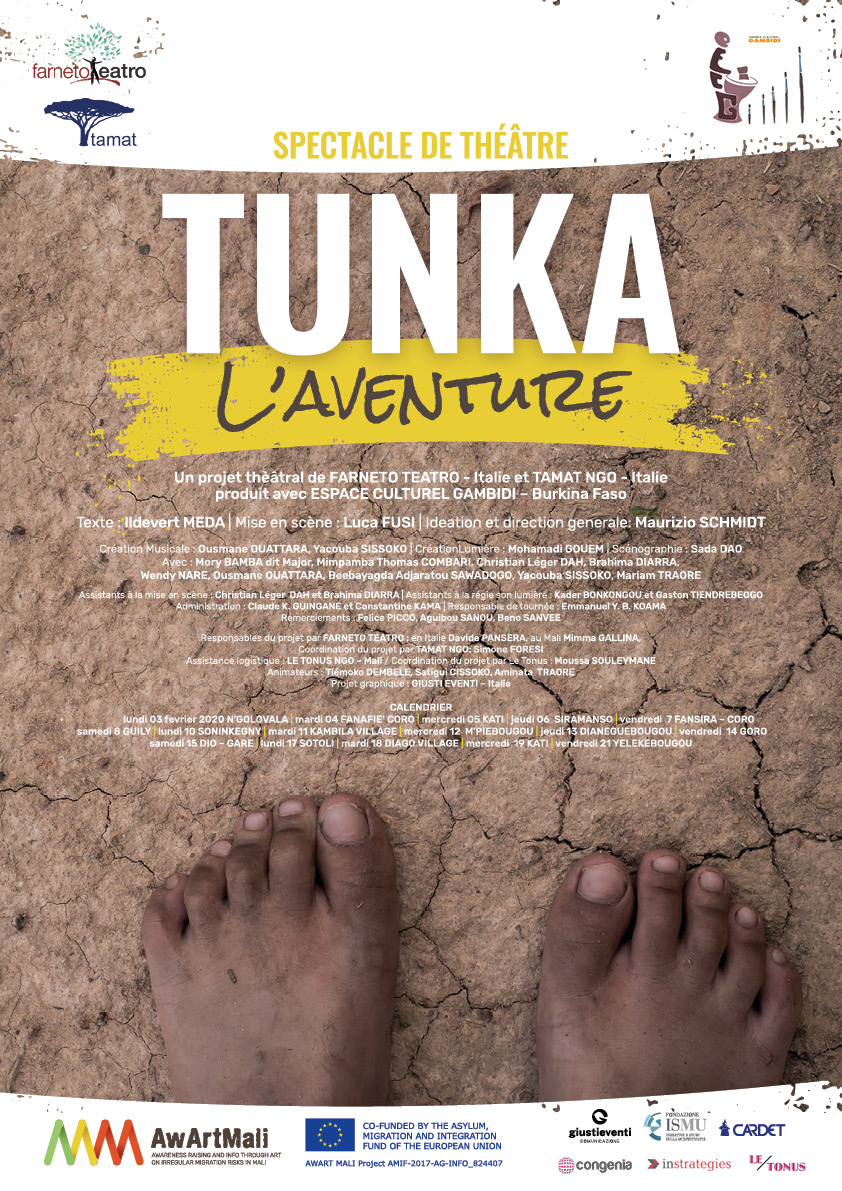
The theatrical caravan composed of 7 actors and 2 musicians, coming from Mali, Burkina Faso and Ivory Coast, as well as technicians and project staff, will leave for Bamako, where it will touch 5 different spaces, the city of Kati and 14 villages in Mali.
The project developed by Maurizio Schmidt, aims to contribute to change the perception and behaviour of people who see irregular migration to Europe as the only possible solution to their economic problems. The live presence in the villages and the debate between the public and actors which constitutes the second fundamental time in the “awareness-raising theatre”, has the aim to promote the discussion on migration and it will be an opportunity to provide
information on the economic opportunities existing in Mali, that may constitute a concrete alternative to choosing to leave (and to that -no less difficult- to return).
The text writer, Ildeverd Meda, and the director Luca Fusi had a difficult task: to find a theatrical synthesis starting from the interviews conducted by Maurizio Schmidt in Italy, Spain and Mali (with migrants and returning migrants) and improvisations (in turn requested by some interviews), around the theme of emigration. The result is particularly convincing, the stronger themes that emerged in the interviews -and that will return in the documentary in the making- were picked and elaborated, placed in a reliable context: a group of migrants repatriated, in a centre in Africa (perhaps in Mali or elsewhere), tell their misadventures. You can hear the words, the truths emerging from the interviews, here and there also the characters of the interviewees, but the play of the theatre, the rhythm of the narration, the music, prevent a realism or an excessive drama.
The story starts from the economic problems that are at the origin of migration (very concretely the relationship between the fruit and vegetable production and the variations of the prices), the family dynamics, but also the attraction for the image of Eldorado that the western gives of itself; therefore the departure to the adventure, the trap of the desert, the decimation during the course of the trip, the arrival in Libya, the violence, the feelings of guilt for having made it; and the sea, the shipwreck, the confusion at the arrival, the clash between dream and reality.
Finally, the comeback, the humiliation, but also the possible comfort of the story and meeting with the companions of adventure.
Luca Fusi, who has worked in Burkina Faso for many years and is the Centre Gambidi school director, points out that “the show uses different theatrical languages: the word, mime, dance and live music, which accompanies and guides the story according to the powerful Mandinga tradition. The text underlines the importance of communicating on the theme: talking about migration, listening to migrants and their adventures, with respect for the courageous who have exposed themselves to the harshest risks and humiliations. Courage also required to those who have chosen to return, explain, plan for a new future in their country, as emerges very clearly in the interviews with returning migrants (some of whom will be present in the villages of Mali).
The beginning of the show is entrusted to the famous incipit of “Se questo è un uomo” by Primo Levi, translated into Bambara: powerful words and even more shocking for the historical short circuit that provoke. Remembering and telling is important, what happened can happen – and it happens again. The ending, the meaning of the show is enclosed in a line: « On en parlera, on en parlera… un en parlera encore demain et après-demain et encore. On organisera des représentations publiques. Le monde doit savoir… nos familles doivent savoir…. Tu verras, madou, que cela nous aide à vivre, encore. »
The show has a great emotional impact, but with moments of lightness, without intellectualism and rhetoric, full of visual suggestions. The stories and short monologues interweave the French language and the Bambara (the balance between the languages will be different in Burkina Faso –where French is a bridge language- and in Mali, where is little spoken and will remain only a few lines), and are taken up by choreographic and mimic movements, while music guides, accompanies and emphasizes: intertwined languages that make them immediately understandable.
We remind that, this show represents the heart of the communication campaign within AwArtMali, a project co-financed by the Asylum, Migration and Integration Fund of the European Commission, coordinated by the Tamat NGO in partnership with Fondazione ISMU (Italy), Communication Agency Giusti Eventi (Italy), Farneto Teatro (Italy), CARDET (Cyprus), INSTRATEGIES (Spain), CONGENIA (Spain), NGO Le Tonus (Mali).
What is AwArtMali
AwArtMali aims to contribute to the change of perceptions and behaviour of Malian people looking to irregular migration towards the EU as the only solution to their socio-economic problems.
The action is intended to reach and involve Malian people in order to make them aware and inform them on the risks of irregular migration, on legal alternatives and on economic opportunities available in their country with a multistakeholder approach consisting in awareness campaign and information activities.
CALENDAR
BAMAKO
Wednesday 29th January, 20 h Théâtre Acte Sept
Thursday 30th January, 21.55 h, Théâtre Blomba
Friday 31st January,10 h, Conservatoire
Saturday 1st February, 17 h Happy Theater
Thursday 20th February, 20 h, Institut Français
N’GOLOVALA
Monday 03rd February 2020
FANAFIE’ CORO
Tuesday 04th February 2020
KATI
Wednesday 05th February 2020
SIRAMANSO
Thursday 06th February 2020
FANSIRA – CORO
Friday 7th February 2020
GUILY
Saturday 8th February 2020
SONINKEGNY
Monday 10th February 2020
KAMBILA VILLAGE
Tuesday 11th February 2020
M’PIEBOUGOU
Wednesday 12th February 2020
DIANEGUEBOUGOU
Thursday 13th February 2020
GORO
Friday 14th February 2020
DIO – GARE
Saturday 15th February 2020
SOTOLI
Monday 17th February 2020
DIAGO VILLAGE
Tuesday 18th February 2020
KATI
Wednesday 19th February 2020
BAMAKO
Thursday 20th February, 20 h, Institut Français
YELEKEBOUGOU
Friday 21st February 2020





